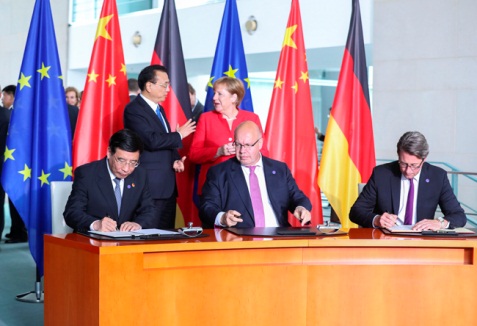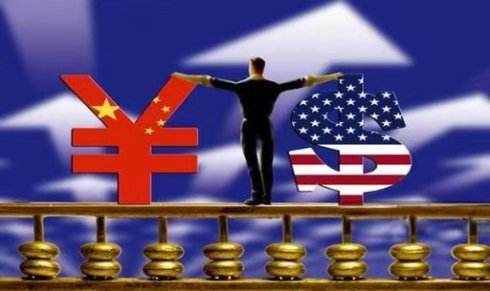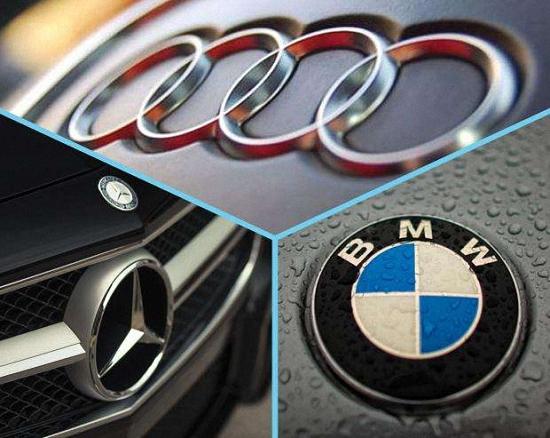From July 9th to 10th, during the fifth round of trade consultation between the Chinese and German governments and the official visit to Germany during the fifth round of trade negotiations between the Chinese and German Premier Li Keqiang, China and Germany were in agriculture, education, youth, health, chemical, communications, More than 20 bilateral cooperation documents have been signed in the automotive and other fields, with a total value of nearly 30 billion US dollars. Among them, the economic and trade cooperation in the automotive field has attracted widespread attention from outside the industry and has far-reaching implications for the automotive industry in China and Germany.

Under the witness of the two prime ministers, Sino-German signed eight cooperation projects in the automotive field, with the largest number of history, including: Ningde era announced the settlement of Germany, Brilliance and BMW signed a long-term development agreement, Volkswagen will be with Jianghuai Automobile and Xiyate set up R&D center, Bosch cooperated with Weilai, Great Wall and BMW officially cooperated, Daimler and Tsinghua University further deepened cooperation, Volkswagen cooperated with FAW and Guoqi (Beijing) Intelligent Networking Automobile Research Institute to help German economy and trade, China The German government signed the "Joint Intention Statement on Cooperation in the Field of Automated Networking". These projects cover the automotive industry chain forward-looking areas such as power batteries, new energy vehicles, intelligent network links, and standards and regulations.
Fu Yuwu, honorary chairman of the China Automotive Engineering Society, pointed out that from the joint development of new technologies to the establishment of joint ventures, the signing of a series of economic and trade cooperation projects in the automotive field is dazzling, but overall, under the current complex economic and trade system China is accelerating the pace of opening up to the outside world and accelerating cooperation with Europe.
Looking back at the annual meeting between the Chinese and German prime ministers, it is not difficult to find that in addition to achieving the advantages of complementarity and strong alliance, it is rare for China and Germany to cooperate in such a dense and extensive manner. During the extraordinary period of escalation, the cooperation between China and Germany clearly adds a deeper meaning to the daily economic and trade exchanges.
On the eve of Premier Li Keqiang’s arrival in Germany, Mei Xinyu, a researcher at the Institute of International Trade and Economic Cooperation of the Ministry of Commerce, pointed out in an interview that the visit was conducted in the context of the United States’ overall economic war, although China did not seek an alliance. But objectively speaking, this will promote cooperation between China and other injured countries in various aspects. Sino-German economic and trade cooperation is one of them.
The United States deliberately provokes China to face the battle
Since the beginning of 2018, the Trump administration of the United States has adopted trade sanctions against any economy that threatens the US economy for the purpose of achieving "US priority." Many countries and regions, including China, have been implicated in this. "If it is a regular action against other countries, then it is a self-selection action against China, because the United States not only wants to fight for benefits, but also wants to limit China's development." Bai Ming, deputy director of the International Market Research Institute of the Ministry of Commerce, was interviewed by the media. Truthfully pointed out.
In the face of the United States deliberately provoked trade sanctions, Chinese Foreign Ministry spokesman Hua Chunying issued a solemn statement on March 21: "China does not want to fight trade with anyone, but if someone has to force us to fight, then we will not I will be afraid, the second will not hide."
So, on March 23, when US President Trump signed a memorandum to levy a 25% tariff on about 60 billion US dollars of Chinese imports, the Chinese Ministry of Commerce spokesperson publicly stated that he intends to suspend the implementation of the United States. The concessions and other obligations, that is, the import of some products from the United States, the tariff list, the product list tentatively contains 7 categories, 128 tax products. According to 2017 statistics, it involves the export of US$3 billion to the US.

Since then, Sino-US trade friction has escalated. Faced with the provocation of the United States again and again, China has taken the initiative to make a counterattack.
On April 4, the US government announced a 25% tariff on more than 1,300 kinds of imported goods originating in China based on the unilateral determination of the “301 investigationâ€, involving China’s exports to the US$50 billion. On the same day, China decided to impose a 25% tariff on 14 categories of 106 items, such as automobiles originating in the United States, involving US exports of 50 billion US dollars to China.
It is understood that the "301 investigation" is derived from Article 301 of the US Trade Act of 1974. The provision authorizes US trade representatives to initiate investigations into “unreasonable or unfair trade practices†in other countries and may recommend US Presidents to impose unilateral sanctions after the investigation, including the abolition of trade preferences and the imposition of retaliatory tariffs. This investigation was initiated, investigated, decided, and executed by the United States itself and has a strong unilateralism.
On May 29th, the United States announced that it would impose a 25% tariff on 50 billion US dollars of Chinese imports, mainly for "Made in China 2025" products. Three days later (June 2), the third round of Sino-US economic and trade consultations was held in Beijing. The Chinese side said that if the US introduces trade sanctions including tariffs, all the economic and trade achievements reached in the previous rounds of negotiations will not be Will take effect.
Despite this, the United States still determined on June 16 the list of goods subject to tariffs, and imposed a 25% tariff on approximately US$50 billion of goods imported from China, including the first batch of approximately US$34 billion from July 6. Implementation, the second batch of about 16 billion US dollars of goods to be assessed after the assessment. As a counterattack, China immediately decided to impose a 25% tariff on 659 items of approximately US$50 billion worth of imported goods originating in the United States, of which 545 items of approximately US$34 billion were imposed on tariffs on July 6 and added to the remaining goods. The implementation time of the tariff is announced separately.
In the face of China's strong counterattack, Trump announced on June 18 that based on the introduction of a $50 billion tax collection list, it will impose a 10% tariff on 200 billion US dollars of Chinese goods and threaten if China continues to fight back, the United States Additional tariffs will be added to an additional $200 billion in Chinese goods.
On June 19, the Chinese Ministry of Commerce said that if the US side loses its rationality and issues a list, China will have to adopt a combination of quantitative and qualitative measures to make a strong counter-measure.
After the above-mentioned rounds of consultations and negotiations, on July 6, the United States imposed a 25% tariff on the first batch of Chinese products worth $34 billion. China also imposed a 25% import tariff on US products of the same size. He also filed a lawsuit against the WTO on the taxation measures officially implemented under the US “301 Investigationâ€.
On July 9, in order to alleviate the adverse effects of Sino-US trade friction, the Ministry of Commerce of China has taken the following measures: First, continuous assessment of the impact of various enterprises; Second, the increased tax revenue in counter-measures will be mainly used To ease the impact of enterprises and employees; Third, encourage enterprises to adjust the import structure, increase the proportion of imports of automobiles and agricultural products from other countries and regions; Fourth, accelerate the implementation of the State Council on June 15 to actively and effectively use foreign capital and promote high economic Several opinions on quality development, strengthen the protection of legitimate rights and interests of enterprises, and create a better investment environment. Soon, the fourth measure was presented in the fifth round of trade consultations between the Chinese and German governments.
German car companies under pressure
When China was subjected to US trade sanctions, Germany, as Europe's largest economy, also became the stalker of the US Trench government's “tariff stickâ€.
On March 9, 2018, Trump officially signed a tariff decree that would impose a 25% and 10% tariff on US imports of steel and aluminum, respectively. On the day of the news, many countries and related industry associations strongly condemned this.
European Commission President Juncker said that the United States imposed a tariff on imported steel and aluminum as a “blatant intervention.†This unfair move will put thousands of jobs in related industries in Europe at risk, and the EU will not sit idly by and claim that Counter-measures will be taken against the United States.
German Chancellor Angela Merkel subsequently publicly stated that the German and French governments will jointly launch a joint corporate tax system to deal with Trump's tariffs.
The United States finally began to impose tariffs on steel and aluminum imported from the European Union and other economies on June 1. As a counterattack, the EU began to impose 25% on the total of 2.8 billion euros ($3.2 billion) of US goods on June 22. tariff. On the day when the EU retaliatory tariffs came into force, Trump threatened to impose a 20% punitive tariff on all imported cars and auto parts assembled in the EU.

On July 2, the EU responded that if Trump hits auto imports with punitive tariffs, the EU will launch counter-measures along with other major economies, possibly involving $294 billion in trade, equivalent to 2017 US merchandise exports. 19%. In addition, the EU also plans to impose a 10% to 50% tariff on US imports of up to 4.2 billion US dollars (3.6 billion euros) in March 2021.
Undoubtedly, once the United States imposes high tariffs on imported cars from the European Union, the most affected are German and German cars. According to data from the German Automobile Industry Association, German automakers and suppliers export 29.4 billion euros of goods per year to the United States, while imports of related goods from the United States are 6.5 billion euros. At the same time, the automobile industry, as the economic pillar of Germany, contributed more than 30% to the economy, so that Germany's three major automakers: Volkswagen, BMW and Daimler even considered withdrawing investment in the United States as a condition, forcing the United States to eliminate it. The idea of ​​collecting tariffs.
According to the German "Business Daily" reported on July 4, the US ambassador to Germany Richard Grenell told the heads of the three major German car companies that if the EU is willing to cancel the tariff imposed on American cars, the United States will stop doing to the EU. The threat of a 20% tariff on the car.
On July 5th, German Chancellor Angela Merkel said that if the United States gives up the threat of a 20% tariff on EU cars, she is also prepared to support the EU to cut import tariffs on US cars. "I am prepared to support negotiations to reduce tariffs, but not only for the United States." Merkel pointed out that in order to comply with the World Trade Organization (WTO) regulations, once the tariffs on US imports are lowered, import tariffs on other countries must also Decline accordingly.
Sino-German deepening cooperation
It can be said that the unilateralism and trade protectionism initiated by the United States have brought the cooperation between China and Germany closer, especially the deeper strategic cooperation with the automobile as the core. At this time, the multi-faceted cooperation between China and Germany will objectively allow the United States to think and disrupt rules and order, which will cause the United States to lose more opportunities to cooperate with China.
Statistics show that in 2017, Germany's exports to China grew rapidly, reaching 86.2 billion euros. If combined with import and export, China even surpassed the United States to become Germany's most important trading partner.
However, Li Gang, deputy dean of the International Trade and Economic Cooperation Research Institute of the Ministry of Commerce, pointed out that the Prime Minister’s visit and witnessing cooperation are China’s open cooperation in accordance with its own rhythm in line with national interests. “We will not press the US trade war. Abandoning the established open policy is also the rule for maintaining international trade. At the same time, it does not deny that it will objectively put pressure on the unilateral approach of disrupting order.
Cui Hongjian, director of the Institute of European Studies at the China Institute of International Studies, finally stressed that "China, Germany and the EU should not have a partiality on the issue of trade with the United States. They can start negotiations with the United States, but they must also jointly safeguard freedom and openness. International trade order."
Fiber Braided Hydraulic Hose,Hydraulic Braided Hose,Braided Hydraulic Lines,Double Wire Braided Hydraulic Hose
Hebei no one but god energy equipment co.,ltd , https://www.hbwsrubber.com